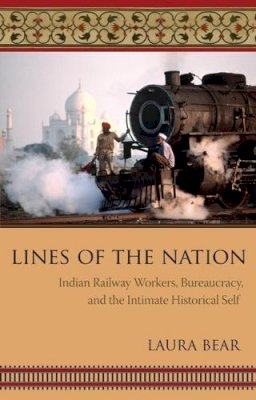
Stock image for illustration purposes only - book cover, edition or condition may vary.
Lines of the Nation: Indian Railway Workers, Bureaucracy, and the Intimate Historical Self
Laura Bear
€ 96.04
FREE Delivery in Ireland
Description for Lines of the Nation: Indian Railway Workers, Bureaucracy, and the Intimate Historical Self
Hardback. Provides the history of the Indian railways. from the design of carriages to the architecture of stations, employment hierarchies, and the construction of employee housing, this book explores the public spaces and social relationships created by the railway bureaucracy. It traces their influence on the formation of Indian nationalism. Series: Cultures of History. Num Pages: 360 pages. BIC Classification: 1FKA; HBTB; KNGT. Category: (P) Professional & Vocational. Dimension: 242 x 163 x 32. Weight in Grams: 734.
Lines of the Nation radically recasts the history of the Indian railways, which have long been regarded as vectors of modernity and economic prosperity. From the design of carriages to the architecture of stations, employment hierarchies, and the construction of employee housing, Laura Bear explores the new public spaces and social relationships created by the railway bureaucracy. She then traces their influence on the formation of contemporary Indian nationalism, personal sentiments, and popular memory. Her probing study challenges entrenched beliefs concerning the institutions of modernity and capitalism by showing that these rework older idioms of social distinction and are legitimized by forms of intimate, affective politics. Drawing on historical and ethnographic research in the company town at Kharagpur and at the Eastern Railway headquarters in Kolkata (Calcutta), Bear focuses on how political and domestic practices among workers became entangled with the moralities and archival technologies of the railway bureaucracy and illuminates the impact of this history today. The bureaucracy has played a pivotal role in the creation of idioms of family history, kinship, and ethics, and its special categorization of Anglo-Indian workers still resonates. Anglo-Indians were formed as a separate railway caste by Raj-era racial employment and housing policies, and other railway workers continue to see them as remnants of the colonial past and as a polluting influence. The experiences of Anglo-Indians, who are at the core of the ethnography, reveal the consequences of attempts to make political communities legitimate in family lines and sentiments. Their situation also compels us to rethink the importance of documentary practices and nationalism to all family histories and senses of relatedness. This interdisciplinary anthropological history throws new light not only on the imperial and national past of South Asia but also on the moral life of present technologies and economic institutions.
Product Details
Format
Hardback
Publication date
2007
Publisher
Columbia University Press United States
Number of pages
360
Condition
New
Series
Cultures of History
Number of Pages
360
Place of Publication
New York, United States
ISBN
9780231140027
SKU
V9780231140027
Shipping Time
Usually ships in 15 to 20 working days
Ref
99-15
About Laura Bear
Laura Bear is lecturer in anthropology at the London School of Economics and Political Science. She is the author of the novel The Jadu House: Intimate Histories of Anglo-India.
Reviews for Lines of the Nation: Indian Railway Workers, Bureaucracy, and the Intimate Historical Self
A most worthwhile read.
Ian J. Kerr American Historical Review This fine piece of scholarship deserves to be read by all those who wish to contribute to the field of historical anthropology.
Manish K. Thakur Journal of the Royal Anthropological Institute Lines of the Nation is a substantial contribution to the study of the railway in South Asian history and society. H-Travel
Ian J. Kerr American Historical Review This fine piece of scholarship deserves to be read by all those who wish to contribute to the field of historical anthropology.
Manish K. Thakur Journal of the Royal Anthropological Institute Lines of the Nation is a substantial contribution to the study of the railway in South Asian history and society. H-Travel
